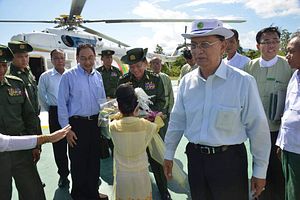Over the weekend, sources reported that Myanmar’s powerful military chief will have his term extended for another five years as parties negotiate the terms of the country’s political transition following a historic election last November.
While Min Aung Hlaing, the head of Myanmar’s armed forces (Tatmadaw) reaches the official military retirement age of 60 this year, observers have wondered whether an extension of his term would be possible and through what means it would occur. Over the past few days, some have suggested that an extension is set to be granted.
“Senior General Min Aung Hlaing, who is turning 60 soon, will take the duty of the commander-in-chief for five more years,” claimed the local newspaper The Voice, citing a military source based in the capital Naypyidaw. It also added that Min Aung Hlaing’s deputy, Soe Win, would also get a five-year extension, claiming that the decisions were announced at the recent quarterly meeting of the top-level military officials.
The Wall Street Journal cited a retired general close to the military leadership as confirming that this was the case.
“If we change the leader of the Tatmadaw at this critical time, the new person would not have the required knowledge to take us forward,” said the general, who is also negotiating on behalf of the military in transition talks with the opposition National League for Democracy (NLD) headed by democracy icon Aung San Suu Kyi. “For these reasons, the military believes [Min Aung Hlaing] is the right person to serve as our commander-in-chief for the next term.”
As of now, there has been no official confirmation from the military or the government if the extension has been granted. It is also unclear through what means the retirement age requirement has been bypassed – whether through presidential approval, legislative change or some other manner.
If this ends up being true, it would suggest a further consolidation of Min Aung Hlaing’s power within the military leadership after he assumed his post five years ago. It would also mean continuity for civilians dealing with Myanmar’s military, which still wields considerable influence in the country including through its control of three key ministries – home, defense and border affairs – along with 25 percent of the seats in the legislature.
Min Aung Hlaing has been intimately involved with hot button issues such as the ongoing peace process with armed ethnic groups. He has already met twice with Suu Kyi and the NLD as the parties have tried to chart the country’s political transition following a decisive victory by the NLD in elections last November over the ruling Union Solidarity and Development Party (USDP) (See: “Myanmar’s Opposition Clinches Majority in Historic Election Win”).
That said, uncertainty still remains about what this means for the country’s transition more specifically as the legislature is set to select the next president on March 17 to replace President Thein Sein. Thus far, the Tatmadaw has refused to suspend a clause in the constitution that would allow Suu Kyi to become president despite the NLD’s decisive victory in the 2015 elections. Asked about such a change happening in an exclusive interview with Channel NewsAsia last January, Min Aung Hlaing said that Myanmar was “still a young democracy” which continued to need a strong military role (See: “Young Myanmar Still Needs Strong Military Role, Says Military Chief”). It is also unclear whether the military will accept Suu Kyi’s wish to be “above the presidency” in practice as it could be read to undermine the spirit of the country’s laws.
Min Aung Hlaing himself has also been floated as a future presidential candidate, which would have its own implications for Myanmar. As I noted in my previous piece, the commander refused to rule out an entry to politics in the future during the Channel NewsAsia interview.
“About becoming president, I will decide, depending on the situation of the times. If I turn my attention to (politics) now, it is likely to weaken the job I’m doing. Right now it is too early to make a decision and talk about it,” he said.

































